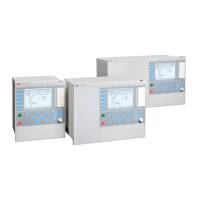( )
( )
( )
( )
0
2
2
sin sin
w l j l j
w
w
j
- ×
=
é ù
= × × + - + - × - ×
ê ú
ë û
= + ×
æ ö
×
=
ç ÷
è ø
L
L
R
t
L
G G
L
L t
L L
L
L
E E
i t I e
Z Z
Z R L
L
atg
R
EQUATION1906 V1 EN (Equation 132)
The line fault current consists of two components:
• The steady-state component which magnitude depends on generator voltage and
absolute value of impedance included in the circuit
• The transient DC component, which magnitude depends on the fault incident angle
decays with the circuit time constant
EQUATION1907 V1 EN (Equation 133)
The basic loop differential equation describing the circuit in figure 88 with series
capacitor is presented by equation 134.
( )
2
2
1
( ) cos
w w l
× + × + = × × × +
l
L
L L L G
L
d i
di
L R i t E t
dt dt C
EQUATION1908 V1 EN (Equation 134)
The solution over line current is in this case presented by group of equations 135. The
fault current consists also here from the steady-state part and the transient part. The
difference with non-compensated conditions is that
• The total loop impedance decreases for the negative reactance of the series
capacitor, which in fact increases the magnitude of the fault current
• The transient part consists of the damped oscillation, which has an angular
frequency b and is dying out with a time constant a
1MRK504116-UUS C Section 3
IED application
219
Application manual

